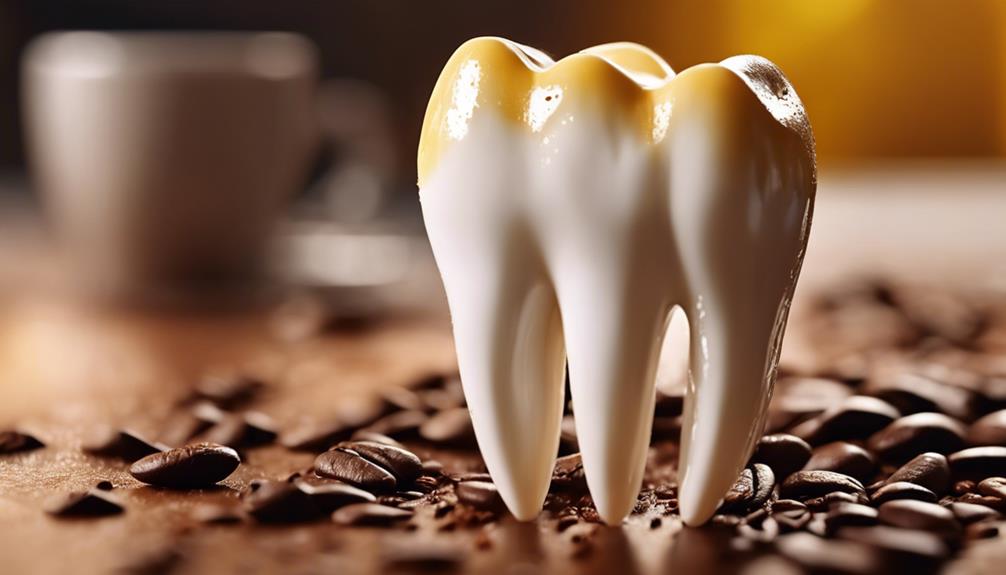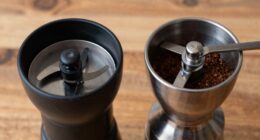As you savor your daily cup of coffee, you may not realize its impact on your teeth. The acidity in coffee can wear away your tooth enamel, leading to cavities, sensitivity, and discoloration. The dark pigments and tannins in coffee also create tough stains. Nonetheless, regular oral hygiene practices, fluoride toothpaste, and reducing sugary additives can help lessen these effects. By prioritizing hydration and sticking to good oral habits, you can minimize the harm coffee can cause. For more information on safeguarding your teeth from coffee’s effects, explore the surprising oral health benefits and methods to prevent stains and erosion.
Key Takeaways
• Regular coffee consumption softens tooth enamel, making it vulnerable to damage and sensitivity.
• Acidity in coffee erodes tooth enamel, leading to cavities, sensitivity, and discoloration.
• Tannins in coffee cause stubborn stains on teeth, which can be removed with regular dental cleanings.
• Good oral hygiene habits, such as daily brushing and flossing, can reduce the risk of coffee-related stains and damage.
• Drinking water after consuming coffee helps wash away staining agents and neutralize acidity, protecting teeth.
Coffee's Impact on Tooth Enamel
When you drink coffee regularly, the acidity in your daily cup can start to soften your tooth enamel, making it more vulnerable to erosion and damage. As a result, your teeth become more susceptible to cavities and sensitivity. The enamel, which is the hardest substance in the human body, is important in protecting your teeth from decay and damage. However, the acidity in coffee can weaken it, making your teeth more prone to damage.
To prevent this, it's important to take proper care of your teeth. Regular dental check-ups and treatments like professional cleanings can help mitigate the impact of coffee on your tooth enamel. By preventing enamel erosion, you can maintain the health and strength of your tooth enamel. This, in turn, can prevent a range of oral health issues, including cavities, sensitivity, and discoloration.
Causes of Tooth Discoloration
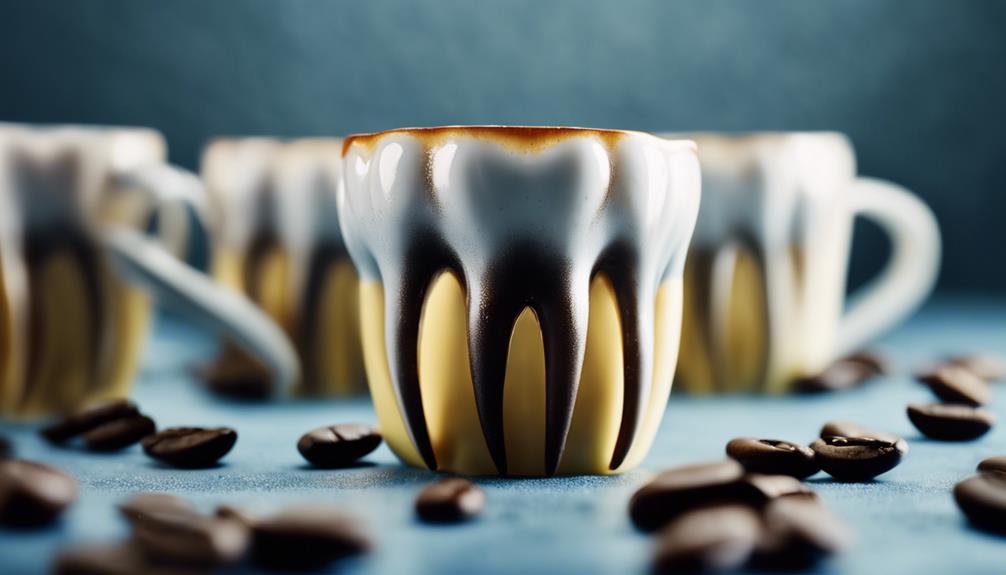
As you sip your daily coffee, the dark pigments and tannins in your cup can start to leave their mark on your teeth, causing discoloration that can be difficult to ignore. The primary culprits behind tooth discoloration from coffee are tannins, which can adhere to the enamel and create stubborn stains.
Additionally, coffee's acidity can contribute to enamel erosion, making teeth more susceptible to staining and discoloration.
Tooth discoloration from coffee consumption can be attributed to the following factors:
- The dark pigments in coffee penetrating the porous enamel surface, leading to visible tooth discoloration over time.
- Coffee's acidity contributing to enamel erosion, making teeth more prone to staining.
- Regular consumption of coffee without proper oral hygiene leading to persistent and noticeable tooth staining.
It's essential to maintain proper oral hygiene to prevent persistent tooth discoloration. Regular brushing, flossing, and dental cleanings can help remove coffee stains and restore the natural color of teeth.
The Role of Acid in Coffee

As you explore the connection between coffee and tooth damage, you'll discover that the acidity of coffee plays a significant role in the process. Additionally, the high acidity of coffee can gradually erode the enamel of the teeth, making them more prone to cavities and sensitivity. This is why it’s important to be mindful of the negative effects of coffee on teeth and take steps to mitigate them, such as drinking water after consuming coffee to help neutralize the acidity and scheduling regular dental check-ups to address any potential damage.
With a pH level around 5, coffee's acidity can erode tooth enamel, leading to sensitivity and cavities.
Understanding the acidic properties of coffee is essential in grasping its impact on your dental health.
Acidic Ph Levels
Your daily cup of coffee may be a morning pick-me-up, but its mildly acidic pH level of around 5 is working against your teeth, wearing them down with each sip. This acidity can lead to enamel erosion, causing cavities, sensitivity, and discoloration.
Here are some key points to keep in mind:
- Enamel erosion can lead to cavities, sensitivity, and discoloration
- Tannins in coffee can cause staining and discoloration of teeth
- Regular dental check-ups and treatments like Zoom Whitening can help mitigate coffee's effects on teeth health
The acidity in coffee can weaken your teeth over time, making them more susceptible to damage. Maintaining good oral hygiene habits and scheduling regular dental check-ups are crucial to prevent enamel erosion and other coffee-related dental issues.
Coffee's Erosive Potential
Coffee's erosive potential is rooted in its acidity, which, when combined with the tannins present, can wreak havoc on your teeth over time. As you drink coffee regularly, the mildly acidic pH level of around 5 can lead to enamel erosion, causing cavities, sensitivity, and tooth discoloration.
The tannins in coffee also contribute to staining and discoloration, affecting the appearance and overall health of your teeth.
To mitigate these effects, regular dental check-ups are essential. Professional treatments like Zoom Whitening can help restore your teeth's natural whiteness. However, preventing enamel erosion through proper dental care and hygiene practices is vital. By maintaining good oral hygiene habits, you can minimize the impact of coffee's acidity on your teeth.
Don't let coffee's erosive potential catch you off guard – stay on top of your dental health and enjoy your coffee guilt-free. Remember, a healthy smile is just a dental check-up away!
How Coffee Affects Tooth Sensitivity
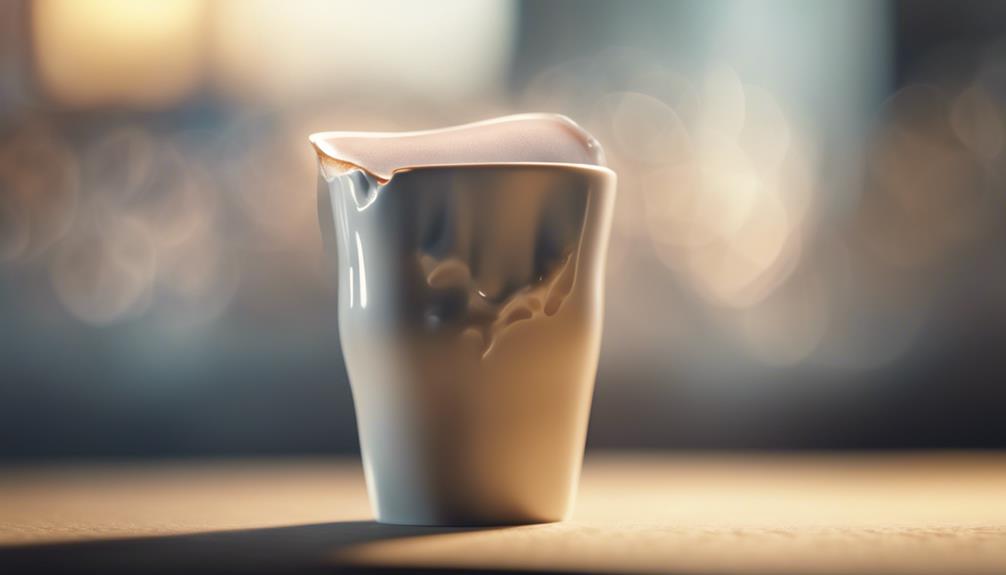
When you drink coffee regularly, the acidity in your daily cup can quietly chip away at your tooth enamel, setting the stage for sensitivity and discomfort. The erosion of enamel can lead to increased tooth sensitivity, making you wince at hot or cold temperatures. This is because the acidity in coffee can expose the dentin beneath, causing hypersensitivity.
Here are some key ways coffee can affect your teeth:
- Enamel erosion from coffee can expose dentin, leading to discomfort and sensitivity to hot or cold stimuli.
- The acidic nature of coffee can aggravate existing dentin hypersensitivity, intensifying the sensation of pain.
- Individuals with sensitive teeth may experience heightened discomfort when consuming acidic beverages like coffee.
Managing tooth sensitivity involves limiting acidic drinks like coffee and practicing good oral hygiene to protect enamel.
Preventing Stains With Good Habits

To prevent coffee stains, you'll need to develop good habits that prioritize daily oral hygiene and regular dental checkups.
By incorporating these habits into your routine, you'll be able to minimize the damaging effects of coffee on your teeth.
Daily Oral Hygiene
By adopting a rigorous daily oral hygiene routine, you can greatly reduce the risk of coffee stains and maintain a healthy, sparkling smile. Brushing your teeth twice a day and flossing daily are essential habits to prevent tooth decay and stains.
Using fluoride toothpaste strengthens enamel, reducing the risk of staining from coffee.
To further prevent stains and maintain good oral hygiene, remember:
- Limit sugary additives in your coffee to maintain oral health
- Drink water after consuming coffee to wash away staining agents and prevent enamel erosion
- Brushing your teeth regularly helps remove plaque buildup, reducing the risk of stains
Regular Dental Checkups
Regular dental checkups, ideally scheduled at least twice a year, become your first line of defense against coffee stains and other oral health issues. By attending routine checkups, you can catch any potential problems early on, preventing coffee stains from becoming a permanent fixture on your teeth.
During these checkups, your dentist can professionally clean your teeth, removing any plaque buildup and coffee stains that have already formed. This proactive approach can also help prevent more extensive treatments down the line. Additionally, your dentist may offer professional whitening treatments to address coffee-induced teeth discoloration.
Removing Coffee Stains at Home
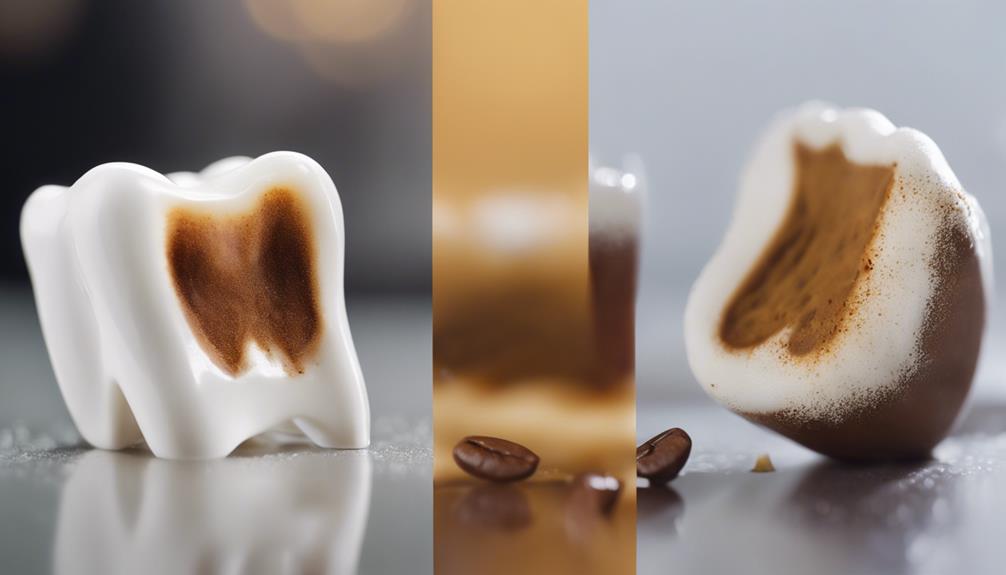
Get rid of those pesky coffee stains at home with a few simple, natural remedies that'll leave your teeth looking brighter and whiter. You can try making a paste with baking soda and water to gently scrub away stains. Alternatively, consider using hydrogen peroxide or apple cider vinegar as natural stain removers.
For more stubborn stains, try brushing with a mixture of lemon juice and salt. You can also try oil pulling with coconut oil, which may help reduce coffee stains and promote oral health.
Here are some other home remedies you can try:
- Activated charcoal can help absorb coffee stains and brighten teeth
- Mix salt and baking soda to create a natural scrub
- Use a straw when drinking coffee to minimize contact with your teeth
The Importance of Regular Cleanings
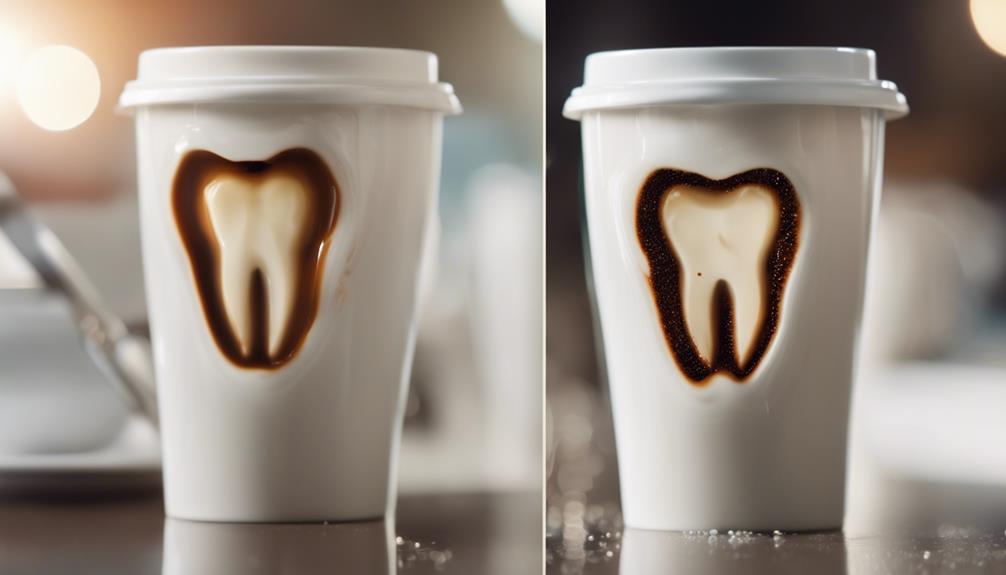
You can't rely solely on home remedies to remove coffee stains and maintain good oral health, which is why scheduling regular cleanings with your dentist is vital. Professional dental cleanings are essential for removing stubborn stains and detecting early signs of enamel erosion or other dental issues caused by coffee consumption. Biannual cleanings can help keep your teeth white and healthy, reducing the impact of coffee on your dental health.
During these cleanings, your dentist can also perform professional teeth whitening treatments to remove set-in coffee stains, leaving you with a brighter smile. Regular cleanings can prevent extensive treatments by addressing stains and plaque buildup effectively. By prioritizing regular dental cleanings, you can make sure that your teeth remain healthy and strong, despite your love for coffee.
Don't underestimate the importance of these cleanings – they're a critical step in maintaining good oral health.
Coffee's Surprising Oral Health Benefits

While sipping your morning coffee, you're also reaping some surprising oral health benefits that might just outweigh the drawbacks. Coffee contains antioxidants that can reduce inflammation and protect against oral diseases like periodontal disease. Additionally, compounds in coffee may inhibit the growth of oral bacteria, potentially reducing the risk of cavities and gum disease.
Some of the key oral health benefits of coffee consumption include:
- Reducing the risk of tooth decay by preventing the formation of plaque and reducing the growth of oral bacteria
- Protects your teeth from staining, as the polyphenols in coffee have antimicrobial properties that help maintain a healthy balance of oral bacteria
- Lowering the risk of developing oral cancers, as suggested by some studies
Drinking black coffee without added sugar can be particularly beneficial, as it helps prevent the formation of plaque and reduces the risk of tooth decay.
Separating Coffee Myths From Facts

Understanding the importance of distinguishing between fact and fiction is crucial when it comes to coffee's impact on your teeth, as misinformation can lead to unnecessary anxiety and confusion.
You've likely heard that coffee damages your teeth, but what's fact and what's fiction? Let's separate the myths from the facts.
Coffee does stain your teeth due to its tannins and acidity, but this staining is purely cosmetic and doesn't directly damage your tooth enamel. Enamel erosion from acidic beverages like coffee can lead to sensitivity and thinning, but regular dental cleanings can effectively remove stains, emphasizing the superficial nature of staining on tooth enamel.
Using preventive measures like brushing, flossing, and fluoride toothpaste can help strengthen enamel and protect against coffee staining. Cosmetic dentistry can also help address staining concerns.
It's crucial to understand that enamel serves as a protective barrier against decay and sensitivity, and coffee's impact is primarily cosmetic. By understanding the facts, you can enjoy your coffee while maintaining good oral health and protecting your teeth.
Protecting Your Teeth With Hydration

As you work to protect your teeth from the potential negative effects of coffee, it's vital to prioritize hydration.
You can start by making water a regular part of your daily routine, which will help counteract the drying effects of coffee and support overall oral health.
Water for Healthy Teeth
Drinking water regularly can be your teeth's best defense against coffee's damaging effects, and it starts with maintaining saliva production. When you drink your coffee, the acidity and tannins can erode your tooth enamel, but water can help counteract these effects.
By drinking water, you're not only rinsing your mouth of coffee residue but also supporting your saliva production. This is essential because saliva helps neutralize acid and remineralize your teeth.
Here are a few ways water benefits your oral health:
- Water helps wash away coffee stains and residue, keeping your teeth clean and hydrated.
- Regular water consumption boosts saliva production, aiding in enamel protection against coffee damage.
- Drinking water after consuming coffee helps neutralize acidity and prevents staining effects on teeth.
Daily Hydration Habits
By incorporating daily hydration habits into your routine, you can effectively shield your teeth from the damaging effects of coffee and maintain a healthy, sparkling smile. Hydrating regularly not only helps wash away coffee residues from your teeth, reducing the risk of staining, but also supports overall dental health by preventing dry mouth and enamel erosion.
| Hydration Habit | Benefits for Teeth | Why It Matters |
|---|---|---|
| Drinking water after coffee | Neutralizes acidity, promotes saliva flow | Minimizes coffee's negative effects on teeth |
| Hydrating regularly | Washes away coffee residues, supports saliva production | Maintains oral hygiene, prevents staining |
| Keeping well-hydrated | Prevents dry mouth, aids in teeth cleansing | Supports overall dental health |
Frequently Asked Questions
How Can I Drink Coffee Without Damaging My Teeth?
When you drink coffee, you can take steps to minimize its impact on your teeth.
To start, use a straw to reduce direct contact and staining.
After your coffee, wait 30 minutes before brushing your teeth to prevent enamel damage.
Then, rinse your mouth with water to remove residue and prevent stains.
Does Quitting Coffee Help Your Teeth?
When you quit drinking coffee, you're taking a significant step towards healthier teeth. By eliminating coffee from your diet, you reduce the risk of sensitivity and cavities associated with its acidity and tannins.
As a result, you'll likely notice whiter teeth and a healthier smile, free from coffee-related stains and enamel damage. By giving up coffee, you're contributing to maintaining strong and healthy teeth, reducing the need for additional dental treatments.
How Much Does Coffee Damage Teeth?
As you savor your morning coffee, you might wonder how much it's really affecting your teeth. The truth is, coffee's acidic nature, with a pH level of around 5, can cause enamel erosion, leading to sensitivity and a higher risk of cavities.
Additionally, the tannins in coffee contribute to staining and discoloration over time. The good news is that regular dental check-ups and whitening treatments can help mitigate these effects.
Does Black Coffee Cause Tooth Decay?
Simply put, consuming black coffee regularly can increase the risk of tooth decay.
The acidity in black coffee can wear down your tooth enamel, leaving your teeth more prone to decay over time.
Without proper oral hygiene, this acidity can further weaken your enamel, creating conditions favorable for decay.
Conclusion
As you sip your morning coffee, remember that moderation is key. While coffee can damage teeth, it's not the villain it's often made out to be.
By practicing good oral hygiene habits and staying hydrated, you can enjoy your daily cup without compromising your oral health.
Like a delicate balance, your teeth thrive when coffee is savored in harmony with regular cleanings and a healthy diet.
